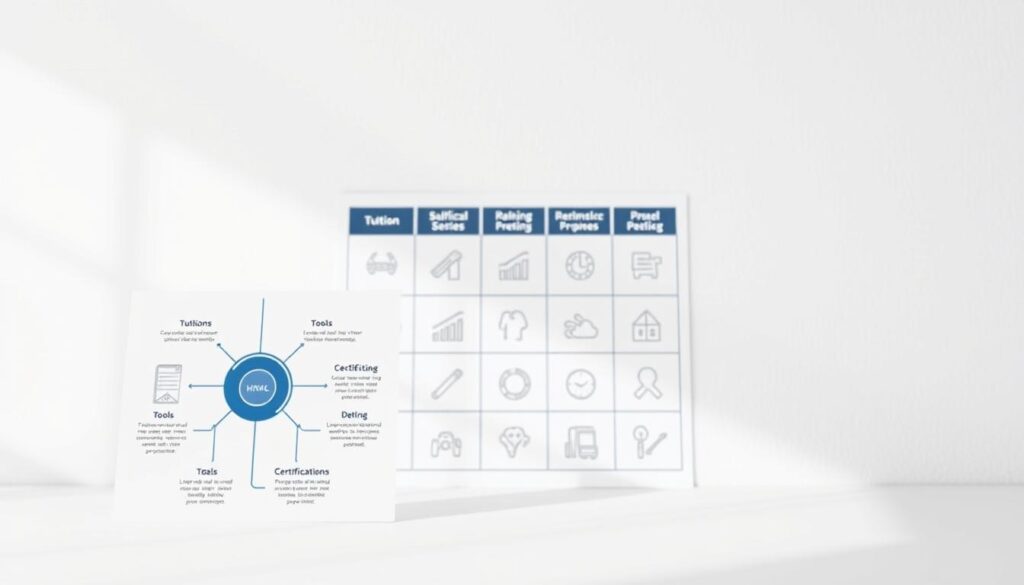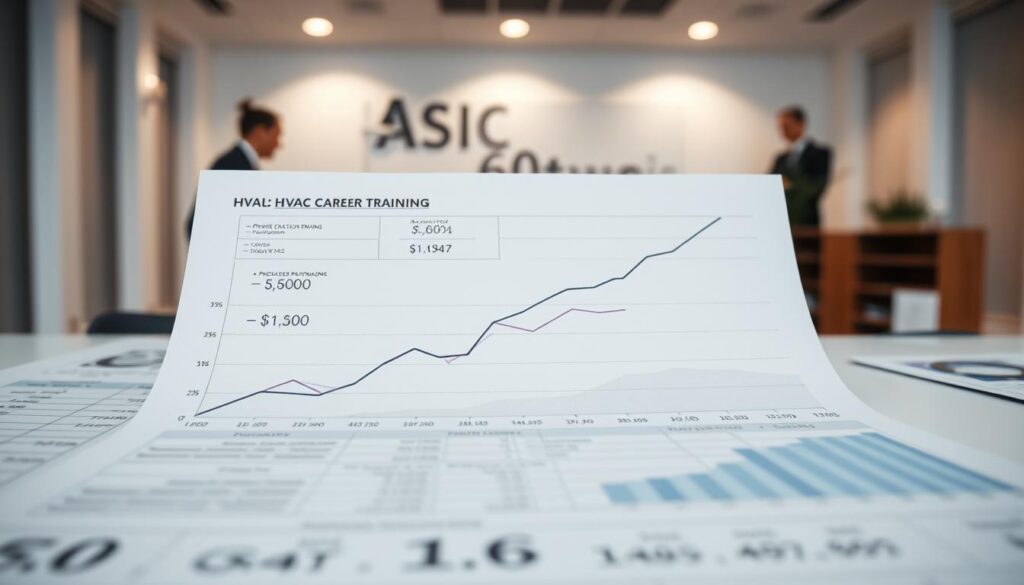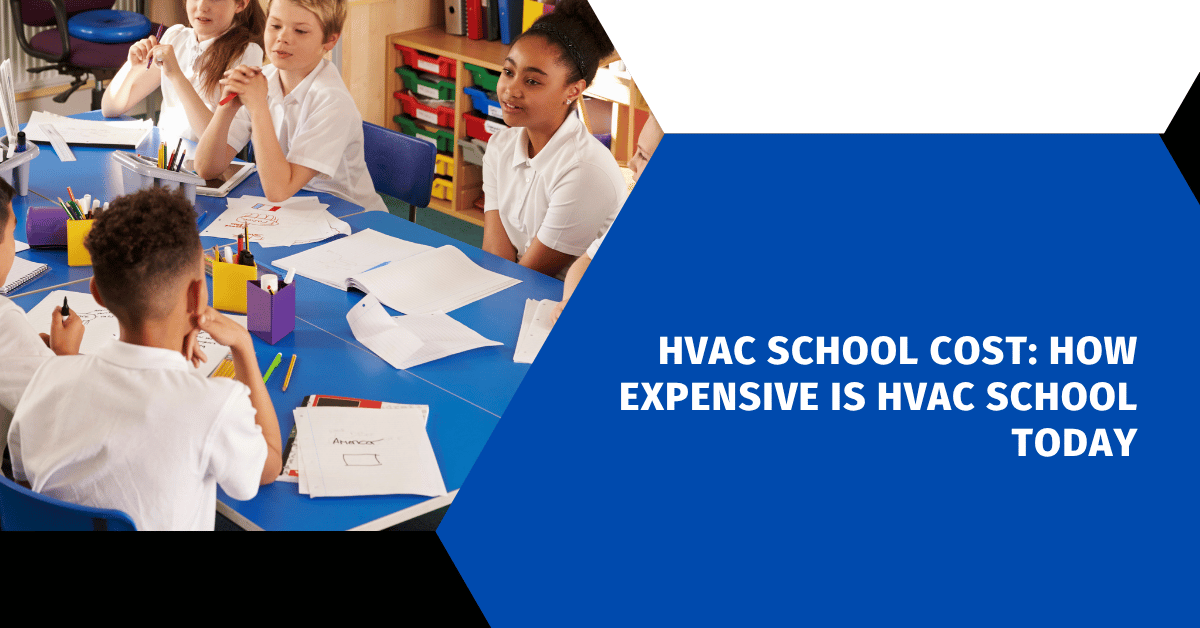Affiliate Disclosure
HVAC Guide Guys is a participant in the Amazon Services LLC Associates Program, an affiliate advertising program designed to provide a means for sites to earn advertising fees by advertising and linking to Amazon.
How Expensive Is HVAC School Today? Are you thinking about starting a career in the HVAC industry? It’s important to know how much it costs. HVAC training can range from $1,200 to $35,000, which might seem a lot at first.

The HVAC field is full of opportunities for those who invest in their education. You can choose from certificate programs to associate degrees. The Bureau of Labor Statistics says HVAC mechanics and installers make a median of $50,590 a year. This makes the initial cost worth it.
Starting your HVAC training doesn’t have to be expensive. There are many educational options to fit your budget and career goals. You can find programs that suit your financial situation.
Key Takeaways
- HVAC school costs vary widely, from $1,200 to $35,000
- Multiple training options exist for different budgets
- Median HVAC technician salary is over $50,000 annually
- Employment in the field is projected to grow by 5 percent
- Financial aid and scholarships can help offset education costs
Table of Contents
Understanding HVAC Career Education Paths
Exploring HVAC education can be tough for those starting out. Your path to becoming an HVAC pro includes several educational routes. Each has its own benefits and costs to consider.
The HVAC field offers many training paths for a successful career. Knowing these options helps you choose wisely for your career and tuition investment.
Certificate Programs vs Associate Degrees
In HVAC education, you’ll find two main paths:
- Certificate Programs
- Duration: 6-12 months
- Cost: $1,200 – $15,000
- Quick entry into the workforce
- Associate Degrees
- Duration: 18-24 months
- Cost: $15,000 – $35,000
- Comprehensive technical knowledge
Apprenticeship Training Options
Apprenticeships offer hands-on learning in the field:
- Typical Duration: 3-5 years
- Cost: $500 – $2,000
- Earn while you learn
- Direct industry experience
Online Learning Opportunities
Online HVAC training is now more common. It’s great for those balancing work and school, often cheaper than classroom learning.
“The future of HVAC education is digital, providing accessible and affordable learning paths for aspiring technicians.” – Industry Expert
| Education Path | Duration | Average Cost | Career Opportunity |
|---|---|---|---|
| Certificate Program | 6-12 months | $1,200 – $15,000 | Entry-level positions |
| Associate Degree | 18-24 months | $15,000 – $35,000 | Advanced technical roles |
| Apprenticeship | 3-5 years | $500 – $2,000 | Comprehensive practical experience |
Choose the path that best fits your career goals, budget, and learning style.
Explore Our HVAC Shop
Looking for top-rated HVAC tools, parts, and accessories? Visit our shop and find the perfect solution for your needs.
Visit the ShopHow Expensive Is HVAC School: Breaking Down the Costs
Looking into HVAC classes, you’ll see many price options. Costs can range from affordable certificate programs to more detailed training paths.
Several factors affect how affordable HVAC courses are. Let’s look at the main cost areas:
- Certificate Programs: $1,200 – $15,000
- Associate Degree Programs: $15,000 – $35,000
- Apprenticeship Training: $500 – $2,000
Here are the main costs you’ll face:
- Tuition fees
- Study materials
- Equipment costs
- Certification expenses
“Your investment in HVAC education can be a gateway to a promising career with projected 15% employment growth by 2026.”
Here’s a detailed cost breakdown for different HVAC educational paths:
| Program Type | Duration | Average Cost |
|---|---|---|
| Certificate Program | 6-12 months | $1,200 – $15,000 |
| Associate Degree | 2 years | $15,000 – $35,000 |
| Community College (In-State) | 2 years | $4,868 per year |
Remember, your total cost includes books, supplies, and certification fees. These can be $500 to $1,000. Licensing exam fees vary by state, from $50 to $150.
Pro tip: Research financial aid, scholarships, and employer sponsorship programs to help manage your HVAC education costs.
Types of HVAC Training Programs and Their Costs
Choosing the right HVAC training program is key to your career success. The cost of your hvac trade school investment varies based on the program you choose. Each path has its own benefits and costs, fitting different career goals and budgets.
Exploring HVAC vocational school costs shows several options for starting your career in the heating, ventilation, and air conditioning field:
Trade School Programs
Trade schools offer practical training for HVAC technicians. Key points include:
- Certificate programs cost between $1,200 and $15,000
- Programs last 6-12 months on average
- Focus on hands-on technical skills
- Fastest way to start working
Community College Options
Community colleges provide deeper HVAC education:
- Associate degree programs cost $15,000 to $35,000
- Public in-state tuition is about $4,868
- Two-year curriculum covers more
- Broader educational base
Technical Institute Training
Technical institutes offer specialized HVAC training:
- Specialized programs cost $10,000 to $30,000
- Focus on advanced technical skills
- Industry-specific certifications
- Potential for quicker career growth
“Your educational path is an investment in your future career success.” – HVAC Industry Expert
Each training option offers unique chances for your HVAC career. Think about your goals, budget, and time when picking the best program for you.
Explore Our HVAC Shop
Looking for top-rated HVAC tools, parts, and accessories? Visit our shop and find the perfect solution for your needs.
Visit the ShopAverage Tuition Rates Across Different States
Understanding hvac training costs can be complex. Tuition rates vary a lot across different states. Where you live greatly affects how much HVAC education will cost you.
Looking into hvac education fees shows big differences between states. Public community colleges are often cheaper than private schools.
| State | In-State Community College Tuition | Out-of-State Tuition |
|---|---|---|
| California | $4,847 | $8,610 |
| Illinois | $7,875 | $10,847 |
| New York | $5,390 | $9,200 |
Several factors affect HVAC training costs:
- Geographic location
- Type of educational institution
- Program duration
- Certification requirements
“Location can dramatically impact your HVAC education investment”
Students should look into local options and compare hvac training costs. This helps find the best and most affordable way to reach their career goals.
Additional Expenses Beyond Tuition
When you plan your HVAC career training budget, remember tuition is just part of it. Many overlook the big extra costs of technical education.
Books and Study Materials
Costs for HVAC certification go beyond classroom fees. You’ll need to budget for textbooks and study materials, which can cost $500 to $1,000 a year. Here’s what you should include:
- Technical manuals
- Reference guides
- Online learning resources
- Practice examination materials
Tools and Equipment Costs
Professional HVAC training needs specific tools and equipment. You’ll spend $600 to $800 on essential items. Here are some key purchases:
- Multimeters
- Refrigerant gauges
- Specialized hand tools
- Safety equipment
Uniform and Safety Gear
Looking professional and staying safe are key in HVAC training. Your budget should include:
| Item | Estimated Cost |
|---|---|
| Work Uniforms | $200 – $400 |
| Safety Boots | $100 – $250 |
| Protective Gear | $150 – $300 |
Some students might also need to pay for moving, which can add $5,000 to $10,000 a year for housing and living costs. Good financial planning helps you prepare for these extra costs in your HVAC career.
Explore Our HVAC Shop
Looking for top-rated HVAC tools, parts, and accessories? Visit our shop and find the perfect solution for your needs.
Visit the ShopCertification and Licensing Costs

Understanding HVAC certification expenses can be tricky. To become a professional HVAC technician, you need to pass through several key steps. Each step has its own cost.
The cost for HVAC certification can vary a lot. It can be from $1,500 to $30,000, depending on the program and your area of focus. Knowing these costs helps you plan your education better.
Key Certification Expenses
- EPA 608 Certification: $40 to $240
- State Licensing Fees: $100 to $300 (initial)
- Annual License Renewal: $50 to $150
- Professional Certification Exams: $50 to $150
Places like North American Technician Excellence offer important certifications. Certified technicians often have a competitive edge in the job market. They have better chances of getting good jobs.
“Investing in certification is investing in your professional future.” – HVAC Industry Expert
Your tuition for the HVAC program will cover some certifications. But, you should also budget for extra exam and licensing fees. Each state has its own rules, so make sure to check yours.
| Certification Type | Estimated Cost | Duration |
|---|---|---|
| EPA 608 Certification | $40 – $240 | 1 Day |
| State Initial License | $100 – $300 | Annual |
| Professional Exam | $50 – $150 | Half-Day |
While these costs might seem high, they are a big investment in your HVAC career. With the job market growing 13% in the next decade, getting certified can lead to many opportunities.
Financial Aid Options for HVAC Students
Starting an HVAC career doesn’t have to be expensive. There are many ways to make your education more affordable. Knowing about these options can help you get through your studies without financial strain.
Understanding the financial side of HVAC education is key. Students have several ways to cover their costs:
Federal Grants and Loans
The Free Application for Federal Student Aid (FAFSA) is a big help. It opens the door to important financial aid. You can get:
- Pell Grants for those with lower incomes
- Direct Subsidized and Unsubsidized Loans
- Federal Work-Study programs
Industry-Specific Scholarships
Professional groups offer special financial help for HVAC students. Some notable scholarships include:
- ASHRAE Engineering Scholarship
- Home Depot Foundation scholarships
- HVAC industry-specific awards
Employer Sponsorship Programs
Many HVAC companies support their future employees by helping with education. Look for:
- Tuition reimbursement programs
- Apprenticeship opportunities
- On-the-job training with financial help
“Investing in your HVAC education today can unlock significant career opportunities tomorrow.”
With careful planning and research, you can cut down your education costs. This way, you can start a rewarding HVAC career without financial worries.
Explore Our HVAC Shop
Looking for top-rated HVAC tools, parts, and accessories? Visit our shop and find the perfect solution for your needs.
Visit the ShopProgram Duration and Cost Comparison
Exploring HVAC training costs reveals various paths with different lengths and costs. Knowing these differences helps you choose the right path for your career.
Different HVAC programs offer unique benefits in terms of time and cost:
- Certificate Programs
- Duration: 6-12 months
- Cost Range: $1,200 – $15,000
- Quick entry into workforce
- Associate’s Degree Programs
- Duration: 18-24 months
- Cost Range: $15,000 – $35,000
- Comprehensive technical education
- Apprenticeship Programs
- Duration: 3-5 years
- Cost Range: $500 – $2,000
- Earn while you learn
| Program Type | Average Duration | Total Cost | Career Opportunity |
|---|---|---|---|
| Certificate | 9 months | $5,000 | Entry-level positions |
| Associate’s Degree | 2 years | $20,000 | Technical roles |
| Apprenticeship | 4 years | $1,500 | Skilled technician |
Your choice depends on your goals, budget, and career dreams. Shorter programs offer faster entry, while longer ones provide more training.
“Invest in your education wisely – the right HVAC training can launch a rewarding career.” – HVAC Industry Expert
Remember, HVAC training costs are an investment in your future. Experienced technicians can earn up to $75,000 a year.
Return on Investment in HVAC Education

Investing in HVAC career training is a smart move. It offers great long-term benefits. The Bureau of Labor Statistics shows HVAC jobs are promising, with a median salary of $51,340. Job growth is steady.
When looking at your hvac trade school investment, here are some financial points to consider:
- Average HVAC technician program tuition: $11,630
- Potential annual return on investment: $51,390
- Typical program completion time: 2 years or less
Your hvac career training budget can lead to big returns. Compared to traditional four-year college degrees, trade school is more affordable. It also gets you into the workforce faster.
| Education Path | Total Cost | Potential Annual Earnings | ROI Timeframe |
|---|---|---|---|
| HVAC Technician Program | $11,630 | $51,390 | Less than 3 years |
| Four-Year College Degree | $38,000+ | Varies | Up to 15 years |
“Choosing an HVAC career provides a practical path to financial stability with minimal educational investment.” – Industry Expert
The strategic advantages of HVAC education go beyond just money. You’ll also get:
- Rapid workforce entry
- Lower educational expenses
- High demand for skilled technicians
- Potential for specialization and advancement
By planning your hvac career training budget well, you can turn a small investment into a rewarding career.
Choosing Between Different HVAC Schools
Choosing the right HVAC school is important. It affects your future career and earnings. Knowing what to look for can help you choose wisely.
Accreditation Considerations
Accreditation is key when looking at HVAC school costs. Look for programs recognized by HVAC Excellence or PAHRA. These schools show they care about quality and follow industry standards.
- Verify institutional accreditation
- Check specialized HVAC program credentials
- Ensure alignment with industry requirements
Program Quality Indicators
Look at program quality through its curriculum and hands-on training. A good HVAC program should include:
- Comprehensive technical training
- Modern equipment and facilities
- Experienced industry instructors
| Program Feature | Importance Level |
|---|---|
| Hands-on Training | High |
| Equipment Quality | Medium-High |
| Instructor Experience | High |
Career Placement Services
Look at schools’ job placement support. Good career services can really help you find a job. Look for programs that offer:
- Resume assistance
- Interview preparation
- Industry connections
- Internship opportunities
“Choose an HVAC school that invests in your future, not just your present training.”
Your HVAC education should match your career goals. It should also give you a solid base for success in the HVAC field.
Explore Our HVAC Shop
Looking for top-rated HVAC tools, parts, and accessories? Visit our shop and find the perfect solution for your needs.
Visit the ShopWays to Reduce HVAC Training Costs
Getting an HVAC education doesn’t have to be expensive. With some planning, you can manage your costs and make your training more affordable. Many students find ways to save money, making their education more budget-friendly.
“Education is an investment in your future, but it doesn’t have to drain your wallet.”
Here are some practical ways to lower the cost of HVAC courses:
- Explore Community College Programs
Community colleges usually have cheaper HVAC training than private schools. Their tuition is often between $1,200 and $5,000 for the whole program.
- Consider Online Learning Options
Online HVAC courses are flexible and can save you money. They cut down on costs for transportation and materials.
- Investigate Employer Sponsorship
Some employers pay for your HVAC training. This can cover a big part of your education costs.
Getting financial aid can also lower your costs. Government grants, scholarships, and loans can help pay for your education.
| Cost Reduction Strategy | Potential Savings |
|---|---|
| Community College Programs | Up to 60% lower tuition |
| Online Learning | Reduced transportation costs |
| Financial Aid | Potential full tuition coverage |
Remember, investing wisely in your HVAC education can lead to long-term career success. With HVAC technicians earning an average of $59,620 a year, your initial investment can pay off big time.
Conclusion
Knowing how much HVAC school costs is key to making a smart career choice. You need to plan your HVAC career training budget well. Costs vary from $10,000 to $37,000, depending on your education path. Public technical colleges are often the cheapest option.
But the pay is worth it. HVAC technicians with an associate’s degree can make up to $798 a week. This is more than the $493 a week for those with just a high school diploma. Over time, you could earn $200,000 more, showing the value of your education.
When planning your HVAC career budget, think about more than just tuition. Consider how long the program is, any scholarships you might get, and what your local job market needs. The HVAC industry is expected to grow 4% from 2019 to 2029. This means good job prospects for those who invest in their education.
Your goal is to find a balance between cost and quality training. Look into different programs, see what financial aid you can get, and make sure your education fits your future in the HVAC field.
FAQ
How much does HVAC school typically cost?
How much does HVAC school typically cost?
FAQ
How much does HVAC school typically cost?
HVAC school costs vary a lot. They can range from
FAQ
How much does HVAC school typically cost?
HVAC school costs vary a lot. They can range from $1,200 for short certificate programs to $30,000 for associate degrees. On average, expect to spend $3,000 to $15,000 for good HVAC training, depending on the school and program length.
What are the different types of HVAC education programs available?
There are many HVAC education options. You can choose from certificate programs, associate degrees, apprenticeships, and online courses. Schools like trade schools, community colleges, and technical institutes offer different programs to fit your needs and goals.
Are there financial aid options for HVAC students?
Yes, there are many financial aid options. You can get federal grants and loans, scholarships, and even employer sponsorship. Many students use federal aid, veteran’s benefits, grants, and HVAC scholarships to cover costs.
How long does HVAC training typically take?
HVAC training times vary. Certificate programs last 6-12 months, associate degrees take 2 years, and apprenticeships can last 3-5 years. Online and part-time programs offer more flexible schedules for working students.
What additional expenses should I budget for beyond tuition?
You’ll need to budget for more than just tuition. This includes textbooks, tools, safety equipment, uniforms, and certification fees. These costs can range from $500 to $3,000, depending on your program and requirements.
Is HVAC training a good investment?
HVAC training is a great investment. The job market for HVAC technicians is growing, with median wages around $50,590. The low costs of education and strong job prospects make it a popular career choice.
Do I need certification after completing HVAC school?
Yes, most states require HVAC technicians to be certified. You’ll need EPA certification for refrigerants and possibly state licensing. Certification costs are usually $50 to $300, depending on the credentials.
Can I work while attending HVAC school?
Many HVAC programs offer part-time or evening classes. This allows you to work while studying. Some programs, like apprenticeships, combine work and classroom learning, making it easier to balance both.
What factors affect HVAC school costs?
Several factors affect HVAC school costs. These include program type, location, school reputation, program length, and whether it’s public or private. Schools in cities and private institutions tend to cost more than community colleges in rural areas.
Are online HVAC programs cheaper?
Online HVAC programs are often cheaper, with prices 20-30% lower than in-person programs. But, HVAC requires hands-on training, so most online programs include some in-person training.
,200 for short certificate programs to ,000 for associate degrees. On average, expect to spend ,000 to ,000 for good HVAC training, depending on the school and program length.
What are the different types of HVAC education programs available?
There are many HVAC education options. You can choose from certificate programs, associate degrees, apprenticeships, and online courses. Schools like trade schools, community colleges, and technical institutes offer different programs to fit your needs and goals.
Are there financial aid options for HVAC students?
Yes, there are many financial aid options. You can get federal grants and loans, scholarships, and even employer sponsorship. Many students use federal aid, veteran’s benefits, grants, and HVAC scholarships to cover costs.
How long does HVAC training typically take?
HVAC training times vary. Certificate programs last 6-12 months, associate degrees take 2 years, and apprenticeships can last 3-5 years. Online and part-time programs offer more flexible schedules for working students.
What additional expenses should I budget for beyond tuition?
You’ll need to budget for more than just tuition. This includes textbooks, tools, safety equipment, uniforms, and certification fees. These costs can range from 0 to ,000, depending on your program and requirements.
Is HVAC training a good investment?
HVAC training is a great investment. The job market for HVAC technicians is growing, with median wages around ,590. The low costs of education and strong job prospects make it a popular career choice.
Do I need certification after completing HVAC school?
Yes, most states require HVAC technicians to be certified. You’ll need EPA certification for refrigerants and possibly state licensing. Certification costs are usually to 0, depending on the credentials.
Can I work while attending HVAC school?
Many HVAC programs offer part-time or evening classes. This allows you to work while studying. Some programs, like apprenticeships, combine work and classroom learning, making it easier to balance both.
What factors affect HVAC school costs?
Several factors affect HVAC school costs. These include program type, location, school reputation, program length, and whether it’s public or private. Schools in cities and private institutions tend to cost more than community colleges in rural areas.
Are online HVAC programs cheaper?
Online HVAC programs are often cheaper, with prices 20-30% lower than in-person programs. But, HVAC requires hands-on training, so most online programs include some in-person training.

